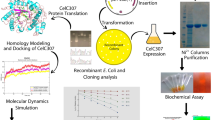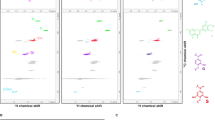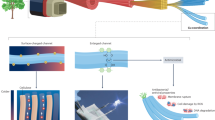Abstract
THE attenuation in the breakdown of protein materials and soluble cellulose dextrin by microorganisms with montmorillonite has been reported by Pinck et al. 1, Ensminger and Gieseking2 and Lynch and Cotnoir3. This attenuation in the case of cellulose dextrin was attributed partially to the inactivation of the enzyme cellulase3.
This is a preview of subscription content, access via your institution
Access options
Subscribe to this journal
Receive 51 print issues and online access
$199.00 per year
only $3.90 per issue
Buy this article
- Purchase on SpringerLink
- Instant access to the full article PDF.
USD 39.95
Prices may be subject to local taxes which are calculated during checkout
Similar content being viewed by others
References
Pinck, L. A., Dyal, R. S., and Allison, F. E., Soil Sci., 78, 109 (1954).
Ensminger, L. E., and Gieseking, J. E., Soil Sci., 48, 467 (1939) .
Lynch, D. L., and Cotnoir, jun., L. J., Soil Sci. Soc. Amer., Proc., 20, 367 (1956).
Allen, O. N., “Experiments in Soil Bacteriology”, 122 (Burgess Pub. Co., Minneapolis, Min., 1951).
Author information
Authors and Affiliations
Rights and permissions
About this article
Cite this article
LYNCH, D., WRIGHT, L. & COTNOIR, L. Breakdown of Cellulose Dextrin and Gelatin in the Presence of Attapulgite. Nature 179, 1131 (1957). https://doi.org/10.1038/1791131a0
Issue date:
DOI: https://doi.org/10.1038/1791131a0



